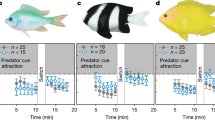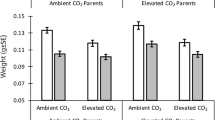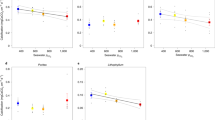Abstract
Experiments have shown that the behaviour of reef fishes can be seriously affected by projected future carbon dioxide (CO2) concentrations in the ocean1,2,3,4. However, whether fish can acclimate to elevated CO2 over the longer term, and the consequences of altered behaviour on the structure of fish communities, are unknown. We used marine CO2 seeps in Papua New Guinea as a natural laboratory to test these questions. Here we show that juvenile reef fishes at CO2 seeps exhibit behavioural abnormalities similar to those seen in laboratory experiments. Fish from CO2 seeps were attracted to predator odour, did not distinguish between odours of different habitats, and exhibited bolder behaviour than fish from control reefs. High CO2 did not, however, have any effect on metabolic rate or aerobic performance. Contrary to expectations, fish diversity and community structure differed little between CO2 seeps and nearby control reefs. Differences in abundances of some fishes could be driven by the different coral community at CO2 seeps rather than by the direct effects of high CO2. Our results suggest that recruitment of juvenile fish from outside the seeps, along with fewer predators within the seeps, is currently sufficient to offset any negative effects of high CO2 within the seeps. However, continuous exposure does not reduce the effect of high CO2 on behaviour in natural reef habitat, and this could be a serious problem for fish communities in the future when ocean acidification becomes widespread as a result of continued uptake of anthropogenic CO2 emissions.
This is a preview of subscription content, access via your institution
Access options
Subscribe to this journal
Receive 12 print issues and online access
$209.00 per year
only $17.42 per issue
Buy this article
- Purchase on Springer Link
- Instant access to full article PDF
Prices may be subject to local taxes which are calculated during checkout



Similar content being viewed by others
References
Munday, P. L. et al. Ocean acidification impairs olfactory discrimination and homing ability of a marine fish. Proc. Natl Acad. Sci. USA 106, 1848–1852 (2009).
Dixson, D. L., Munday, P. L. & Jones, G. P. Ocean acidification disrupts the innate ability of fish to detect predator olfactory cues. Ecol. Lett. 13, 68–75 (2010).
Nilsson, G. E. et al. Near-future carbon dioxide levels alter fish behaviour by interfering with neurotransmitter function. Nature Clim. Change 2, 201–204 (2012).
Briffa, M., de la Haye, K. & Munday, P. L. High CO2 and marine animal behaviour: Potential mechanisms and ecological consequences. Mar. Pollut. Bull. 64, 1519–1528 (2012).
Wittmann, A. C. & Portner, H.-O. Sensitivities of extant animal taxa to ocean acidification. Nature Clim. Change 3, 995–1001 (2013).
Russell, B. D. et al. Predicting ecosystem shifts requires new approaches that integrate the effects of climate change across entire systems. Biol. Lett. 8, 164–166 (2012).
Kroeker, K. J., Gambi, M. C. & Micheli, F. Community dynamics and ecosystem simplification in a high-CO2 ocean. Proc. Natl Acad. Sci. USA 110, 12721–12726 (2013).
Ries, J. B., Cohen, A. L. & McCorkle, D. C. Marine calcifiers exhibit mixed responses to CO2-induced ocean acidification. Geology 37, 1131–1134 (2009).
Kroeker, K. J. et al. Impacts of ocean acidification on marine organisms: quantifying sensitivities and interaction with warming. Glob. Change Biol. 19, 1884–1896 (2013).
Form, A. U. & Riebesell, U. Acclimation to ocean acidification during long-term CO2 exposure in the cold-water coral Lophelia pertusa. Glob. Change Biol. 18, 843–853 (2012).
Miller, G. M., Watson, S. A., Donelson, J. M., McCormick, M. I. & Munday, P. L. Parental environment mediates impacts of increased carbon dioxide on a coral reef fish. Nature Clim. Change 2, 858–861 (2012).
Parker, L. M. et al. Adult exposure influences offspring response to ocean acidification in oysters. Glob. Change Biol. 18, 82–92 (2012).
Dupont, S., Dorey, N., Stumpp, M., Melzner, F. & Thorndyke, M. Long-term and trans-life-cycle effects of exposure to ocean acidification in the green sea urchin Strongylocentrotus droebachiensis. Mar. Biol. 160, 1835–1843 (2013).
Domenici, P., Allan, B., McCormick, M. I. & Munday, P. L. Elevated carbon dioxide affects behavioural lateralization in a coral reef fish. Biol. Lett. 8, 78–81 (2012).
Ferrari, M. C. O. et al. Effects of ocean acidification on visual risk assessment in coral reef fishes. Funct. Ecol. 26, 553–558 (2012).
Chivers, D. P. et al. Impaired learning of predators and lower prey survival under elevated CO2: A consequence of neurotransmitter interference. Glob. Change Biol. 20, 512–522 (2014).
Munday, P. L. et al. Replenishment of fish populations is threatened by ocean acidification. Proc. Natl Acad. Sci. USA 107, 12930–12934 (2010).
Ferrari, M. C. O. et al. Intrageneric variation in antipredator responses of coral reef fishes affected by ocean acidification: Implications for climate change projections on marine communities. Glob. Change Biol. 17, 2980–2986 (2011).
Ferrari, M. C. O. et al. Putting prey and predator into the CO2 equation–qualitative and quantitative effects of ocean acidification on predator–prey interactions. Ecol. Lett. 14, 1143–1148 (2011).
Portner, H. O. & Farrell, A. P. Ecology: Physiology and climate change. Science 322, 690–692 (2008).
Ishimatsu, A., Hayashi, M. & Kikkawa, T. Fishes in high-CO2, acidified oceans. Mar. Ecol.-Prog. Ser. 373, 295–302 (2008).
Esbaugh, A. J., Heuer, R. & Grosell, M. Impacts of ocean acidification on respiratory gas exchange and acid–base balance in a marine teleost, Opsanus beta. J. Comp. Physiol. B. 182, 921–934 (2012).
Munday, P. L., Crawley, N. E. & Nilsson, G. E. Interacting effects of elevated temperature and ocean acidification on the aerobic performance of coral reef fishes. Mar. Ecol.-Prog. Ser. 388, 235–242 (2009).
Fabricius, K. E. et al. Losers and winners in coral reefs acclimatized to elevated carbon dioxide concentrations. Nature Clim. Change 1, 165–169 (2011).
Almany, G. R. & Webster, M. S. The predation gauntlet: Early post-settlement mortality in reef fishes. Coral Reefs 25, 19–22 (2006).
Couturier, C. S., Stecyk, J. A. W., Rummer, J. L., Munday, P. L. & Nilsson, G. E. Species-specific effects of near-future CO2 on the respiratory performance of two tropical prey fish and their predator. Comp. Biochem. Physiol. A. 166, 482–489 (2013).
Hixon, M. A. & Jones, G. P. Competition, predation, and density-dependent mortality in demersal marine fishes. Ecology 86, 2847–2859 (2005).
Wen, C. K. C., Pratchett, M. S., Almany, G. R. & Jones, G. P. Patterns of recruitment and microhabitat associations for three predatory coral reef fishes on the southern Great Barrier Reef, Australia. Coral Reefs 32, 389–398 (2013).
Allan, B. J. M., Miller, G. M., McCormick, M. I., Domenici, P. & Munday, P. L. Parental effects improve escape performance of juvenile reef fish in a high-CO2 world. Proc. R. Soc. B. 281, 20132179 (2014).
Clark, T. D., Sandblom, E. & Jutfelt, F. Aerobic scope measurements of fishes in an era of climate change: respirometry, relevance and recommendations. J. Exp. Biol. 216, 2771–2782 (2013).
Acknowledgements
We thank the people at Upa Upasina (Illi Illi Bwa Bwa), Dobu and Esa’Ala reefs for allowing us to visit their reefs, and Rob van der Loos and the crew of MV Chertan for logistical support. Special thanks to S. Noonan for logistic support and assistance with experiments. The study was funded by the Australian Institute of Marine Science, a Grant for Research and Exploration by the National Geographic Society, and the ARC Centre of Excellence for Coral Reef Studies.
Author information
Authors and Affiliations
Contributions
All authors contributed to the designs of the study, collection and analysis of data, and writing the article.
Corresponding author
Ethics declarations
Competing interests
The authors declare no competing financial interests.
Supplementary information
Rights and permissions
About this article
Cite this article
Munday, P., Cheal, A., Dixson, D. et al. Behavioural impairment in reef fishes caused by ocean acidification at CO2 seeps. Nature Clim Change 4, 487–492 (2014). https://doi.org/10.1038/nclimate2195
Received:
Accepted:
Published:
Issue Date:
DOI: https://doi.org/10.1038/nclimate2195
This article is cited by
-
High abundances of zooxanthellate zoantharians (Palythoa and Zoanthus) at multiple natural analogues: potential model anthozoans?
Coral Reefs (2023)
-
The indirect effects of ocean acidification on corals and coral communities
Coral Reefs (2022)
-
Seasonal variation in reef fish assemblages in the environmentally extreme southern Persian/Arabian Gulf
Coral Reefs (2021)
-
Reply to: Methods matter in repeating ocean acidification studies
Nature (2020)
-
Ocean acidification does not impair the behaviour of coral reef fishes
Nature (2020)



